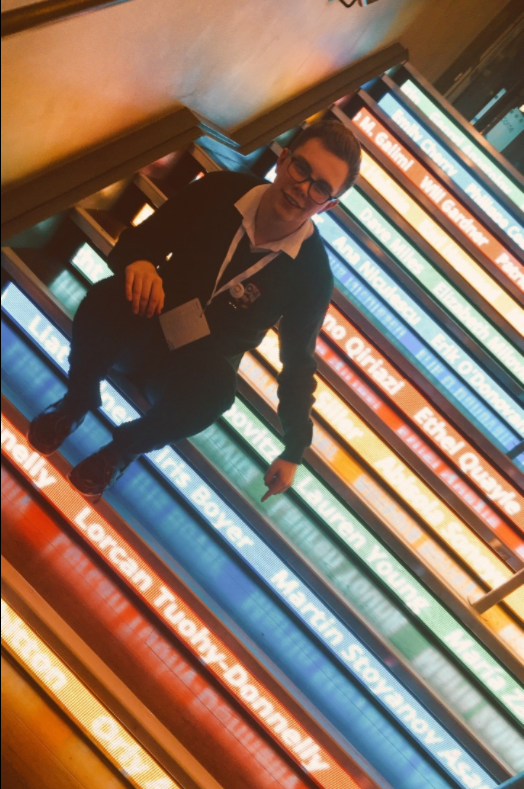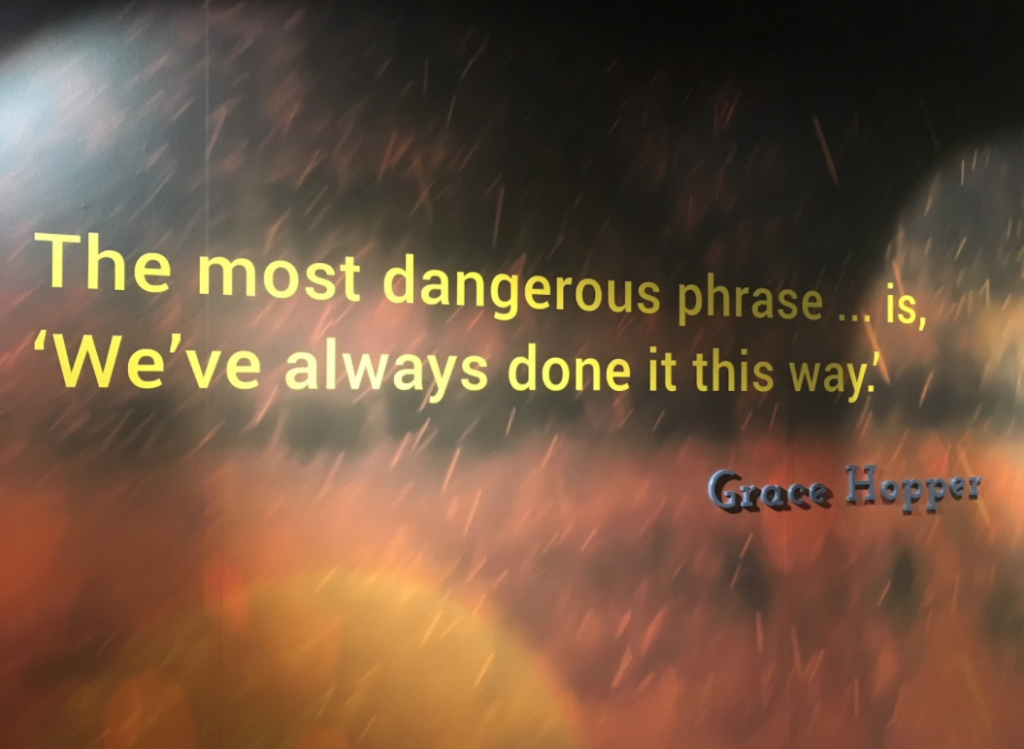Children’s Rights Online: Ongoing Debate, Ongoing Change
By Lorcan Tuohy
My most recent step on my
Webwise journey was an opportunity to take part in a panel discussion as part of the two-day
EMEA Child Safety Summit, hosted jointly by tech giants Google and Facebook this week. This event, now in its third year brings together academics, the Government, NGOs, and experts to share their knowledge and understanding, and discuss the critical issue of child safety online. In their introduction to the Child Safety Summit 2018, Google and Facebook write that they are ‘
working together to meet the challenge of empowering parents and children with the tools and skills they need to make the most of all the internet has to offer’.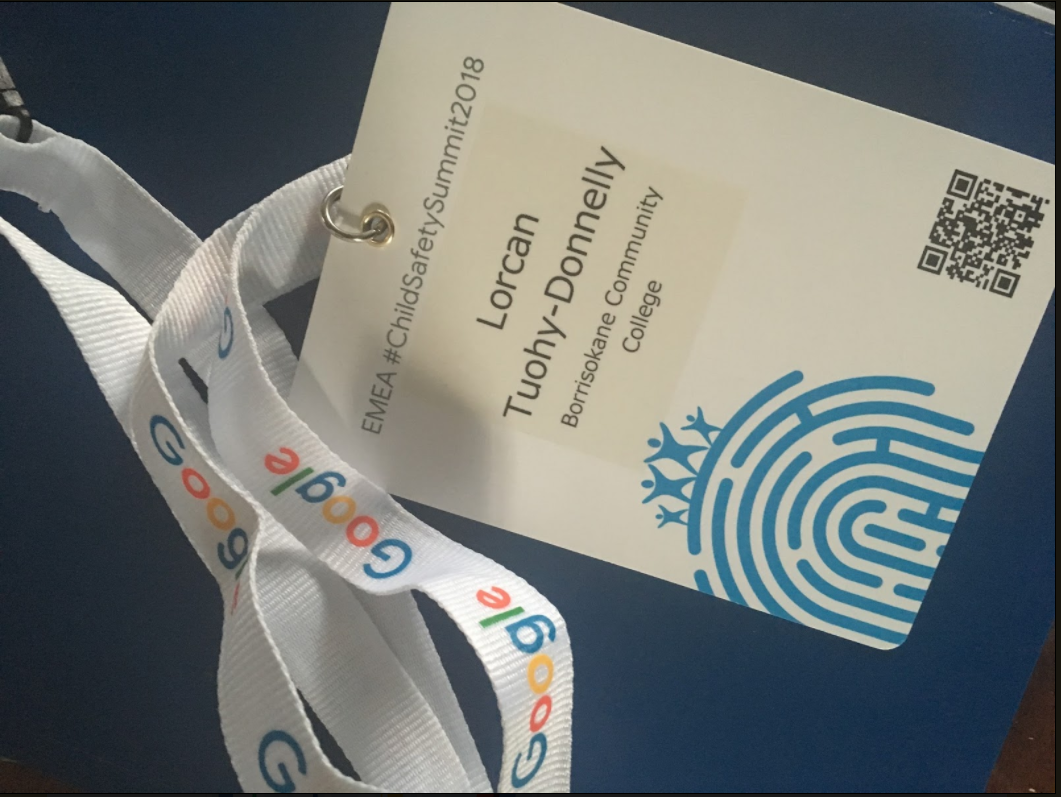
The EMEA Child Safety Summit was a two-venue event on April 18th and 19th, with the first day hosted in Facebook in Grand Canal Dock, continuing in the
Foundry, Google’s digital innovation centre in their European Headquarters on Barrow Street on the second day. I was invited by
Webwise to represent the student voice on a panel discussion on Day 2 which focused on children’s rights online and was chaired by Professor Brian O’ Neill, Director of Research in DIT.
The intention of the panel discussion was to broadly explore the rights that young people have, in terms of the
UN Convention on the Rights of the Child, and how these can be impacted on in the online environment. I am relatively familiar with the UN Convention on the Rights of the Child (UNCRC), as this frames a lot of the work we do in
Tipperary Comhairle na nÓg, but it was certainly interesting and definitely challenging to look at the Convention through the lens of the internet and the online environment.
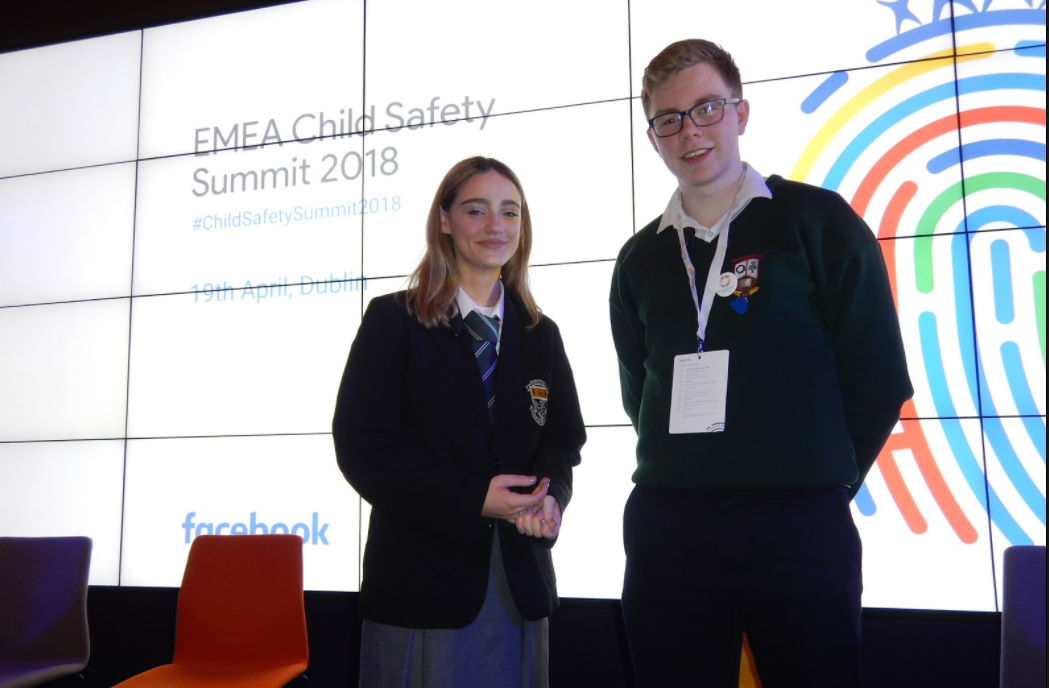
The panel also included my fellow Webwise ambassador Muireann Whelan from Newbridge College, while UNICEF was represented by Patrick Geary who is a Children’s Rights advocate. Jutta Croll came from Germany to share her experience of empowering people online and benefiting from the internet, while Hannah Witton, a Youtuber, brought the perspective of the online creator to the discussion. John Carr joined the panel in the representing the UK Children’s Charities Coalition on Internet Safety. This was privileged company to be in!
At the outset of the panel discussion, Brian introduced myself and Muireann and referred to our roles as Webwise ambassadors. He spoke of how I had been part of the recent Open Debate on Online Safety in March (read my blog post
here), while Muireann had addressed the Oireachtas Committee to give a young person’s perspective on online safety. It really made me think (as I sat their perspiring under the glare of the Google lights ?) how being an ambassador really helps to bring the student voice to the debate and to ensure that our perspectives are heard and hopefully considered.
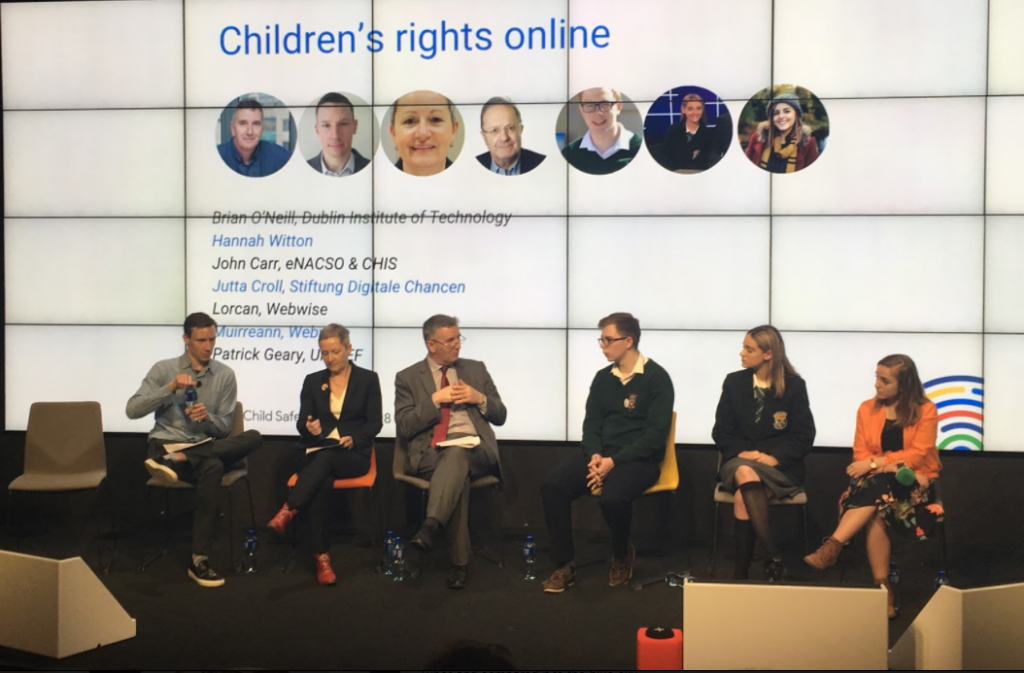
For us, as young advocates for online safety, the panel discussion gave us some really useful insights into how different organisations are trying to make the internet a safer place for young people, while also trying to respect their rights. Jutta spoke of the need to look at the UN Convention on the Rights of the Child to see what this might look like in the digital world and how her organisation were looking at how children could need extra safeguards online. They hope to conclude this work in May and will make the information available to countries. This information could be useful for groups who want to lobby the Government to make the internet a safer place for children.
Patrick from UNICEF explained how the UNICEF thinking has evolved – especially in light of technology. The UNCRC was adopted in 1989- long before the internet became the world that we partially live in today. This digital world challenges the UNCRC to continue to protect children – in particular rights such as the right to privacy and the right to free speech. UNICEF is working on this and developing a toolkit to explain how everyone can support children’s rights and also to ensure that industry can support and respect children’s rights especially with the advent of GDPR.
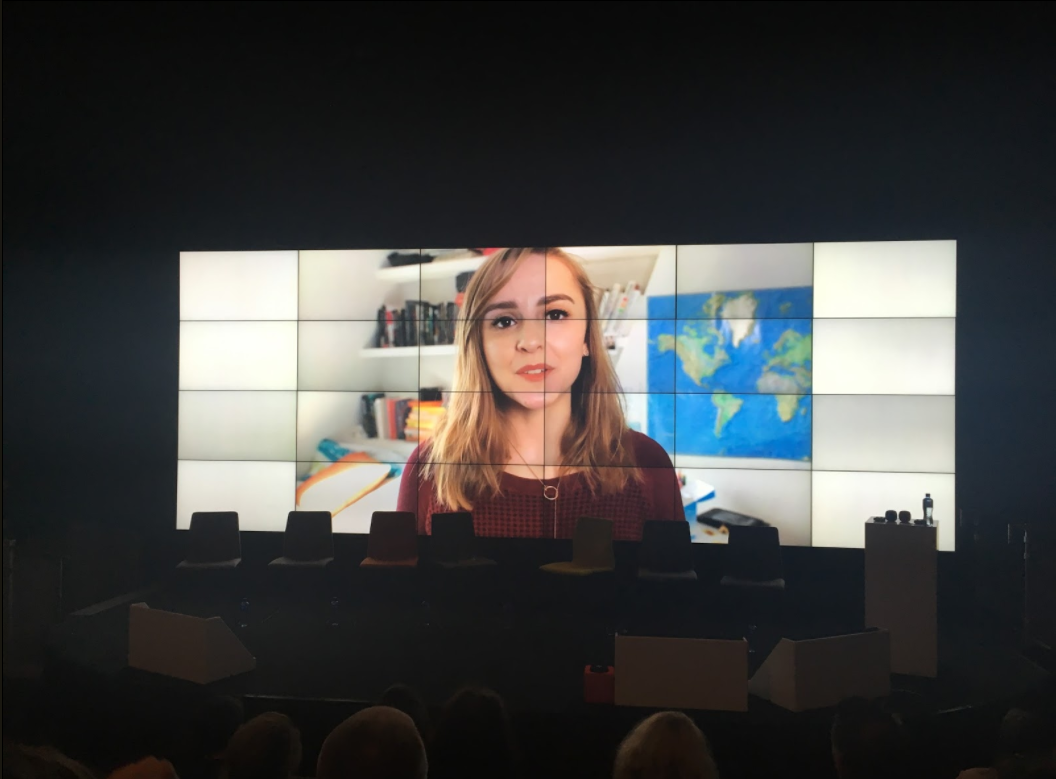
‘When I grow up I want to be a YouTuber’ as a concept drew smiles and giggles from the audience. I’m not sure if that is because this isn’t really seen as a serious career or because we are all unsure about the potential of the online environment.
Hannah Witton spoke about her role as a You Tuber and compared it to the blue-sky thinking ambitions of those who want to be F1 drivers, film stars or astronauts. That is the thing about digital technology- it
is the future and we need to look at the possibilities and potential as well as being mindful and protecting against the dangers.
Muireann and I shared our own experiences of being online. For me, it is a contrast between the risks and rewards. Schoolwork takes on new dimensions when you can research online and access information in real-time. On the other hand, I firmly believe that the wealth of useful information is matched by an equal amount of biased information or ‘fake news’ and we need more training to empower us to become more digitally literate. Equally, the internet and social media give us a voice – as an occasional blogger, Instagrammer and tweeter I appreciate how social media offers me the opportunity to promote issues that are important to me such as positive mental health and online safety. The other side of the coin, in this case, is how this freedom of speech can be abused and used to abuse and bully others as I found out to my peril in my first experiences with Snapchat. In this situation, education is key to help us to use the internet responsibly and to support resilience. Muireann rightly pointed out that a lot of the media coverage focuses on the ‘bad news’ stories of what happens online – it is, as she rightly pointed out, equally important to focus on the positives.
Freedom is what you do with what’s been done to you… the words of philosopher Jean-Paul Sartre in a recent article on digital rights in the
Irish Times.
This is where education comes in – helping us to learn to use the freedom of the internet as responsible digital citizens. This must start early as Muireann pointed out so that responsibility and how to stay safe is learned from the start.
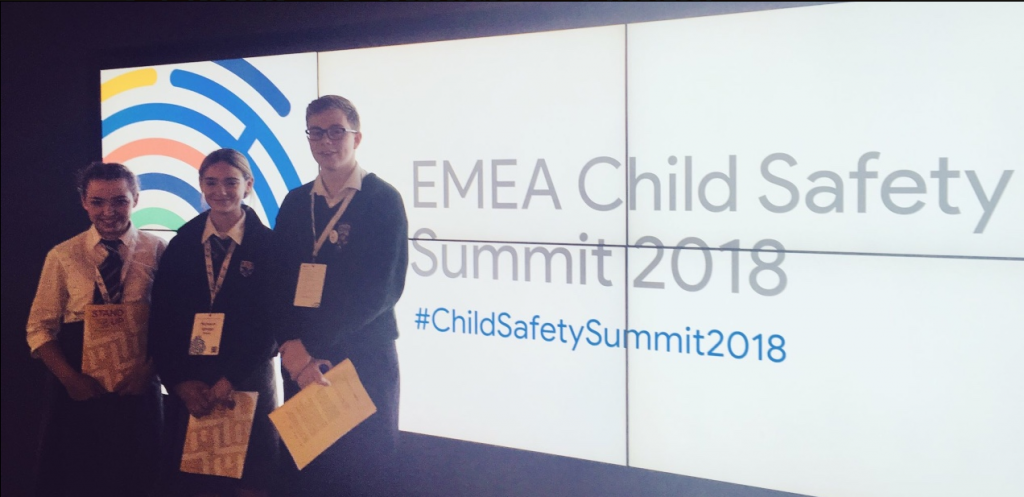
Brian, as chair of the panel also invited audience contributions and Lauren added a further student perspective. The question of education was directed at myself and Muireann and we both agreed that there is a lot being done but there was the potential for so much more. Webwise provides a huge range of free
resources to schools that are tailored to different age groups. The new area of well-being, as part of the new Junior Cycle programme, offers significant opportunities- I would love to see digital citizenship or online safety education becoming a mandatory part of this programme and would encourage schools to look at the Webwise
resources and use these to support student wellbeing.
The impending
GDPR and the significant changes to parental consent under Article 8 were also discussed. This is another contrast in terms of rights, privacy and protection. What strikes me though is that all of the talks around GDPR is in terms of companies being fined for data breaches with the tagline ‘is your business GDPR ready?’ used in the media. For me … I wonder
are parents GDPR ready?
The panel discussion was an hour in length but it flew by – so much more than I have covered in my blog here was discussed. My initial nerves as I was being miked up for the debate, and in the initial exchanges, were soon overcome by my desire to have my voice, and the voice of the young people of Ireland, heard. It was also great to share and discuss issues affecting young people with people from across the UK, Europe and as far afield as Kenya.
Thanks to everyone who made the day possible especially to Brian for chairing the panel and Jane, Tracy and the Webwise team for inviting me to take part.
My final word…
Google like all Silicon Valley companies is an inspirational place for me as a young person hoping for a dream job. The walls in the Foundry hold many inspirational quotes but for me, this one was appropriate given the day that was in it. The most dangerous phrase is… ‘We’ve always done it this way. We can’t do it ‘this way’ anymore because the online world we live in is changing all the time and we have to adapt – how we think, how we talk, how we work and what we learn…





